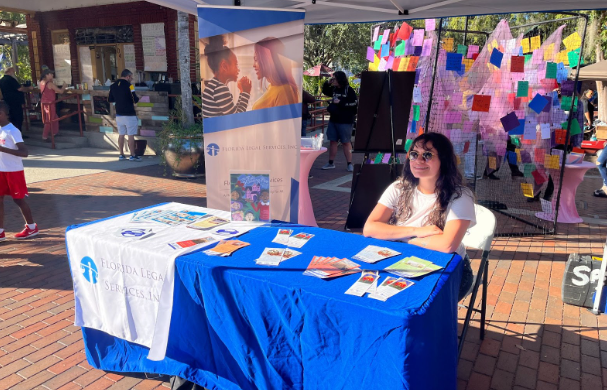October 2023 - Domestic Violence
< Back to All Newsletters
Welcome Note
Hello again! This month, in honor of Domestic Violence Awareness Month, we focus on certain gender based protections that link to theories of Disparate Impact and the Violence Against Women Act. While protections apply to all genders and gender identification, statistically, Domestic Violence related protections play a more predominant role in the lives of women. Survivors of domestic and sexual violence often face housing discrimination because of the violence committed against them. Such discrimination can include being denied admission to, or being evicted from, housing due to acts of violence committed against survivors.
Fair Housing & Domestic Violence
Housing providers often evict the entire household after incidents of Domestic Violence without determining fault or cause.
More than 1 in 3 women (35.6%) and more than 1 in 4 men (28.5%) in the U.S. will experience rape, physical violence and/or stalking by an intimate partner in their lifetime (1).
44% of lesbian women and 61% of bisexual women experience rape, physical violence or stalking by an intimate partner.
In a 2019 survey conducted by the Fair Housing Rights & Research Center in Cleveland, OH (2):
20% of survivors surveyed for this report responded that they struggled to find new housing following an act of domestic violence;
16.7% responded that they faced homelessness.
13% responded that they were evicted because of domestic violence.
https://www.socialsolutions.com/blog/domestic-violence-statistics/#:~:text=More%20than%201%20in%203,partner%20in%20the%20United%20States
https://www.thehousingcenter.org/publications/research-and-reports/domestic-violence/#:~:text=Twenty%20percent%20of%20survivors%20surveyed,evicted%20because%20of%20domestic%20violence.
So What Does It All Mean?
Because women are far more likely to be on the receiving end of sexual violence and domestic abuse, they are more likely to be evicted from housing even though they were not the cause for the eviction.
In abusive relationships, women are often controlled, prevented from working, restricted financially, and disallowed from independent experiences.
This all means that a newly evicted survivor of domestic violence has limited resources and capacity to find housing.
Add to it the additional layer of an eviction on their record often serves as an insurmountable obstacle to housing.
What Can We Do?
The Fair Housing Act and the Violence Against Women Act establishes certain protections related to one’s ability to maintain housing and/or seek safety.
In Public Housing, housing providers are required to provide tenants with constant notice of their rights to seek housing alternatives that promote safe living and due process to maintain housing.
Survivors of Domestic Violence often walk away with mental and physical disabilities that may affect major life activities. These can be presented when seeking a Reasonable Accommodation.
The Theory of Disparate Impact identifies that evicting Survivors who are women establishes an unequal effect when it comes to denying housing, as women are far more likely on the receiving end of abuse.
These protections are available to prevent loss of housing, as long as we educate each other and exercise our rights.
Community Outreach
Upcoming Outreach Events
November 8 - Avalon Presentation
November 9 - Resource Fair for Veterans Palatka
November 17 - Presentation for United Way of North Central FL
Mondays - Learn to Read of St. Johns County- Adult English Language Learning and Legal Topics
What We’ve Been Up To
Compassionate St. Augustine Presentation on Fair Housing
Thank you to Compassionate St. Augustine for welcoming our presentation on Fair Housing. Such a wonderful and spirited community and we are grateful for your efforts!
Alachua Conservation Trust’s Pride
Our outreach coordinator participated in a couple of pride events in Gainesville this month. Our first event was at the Alachua Conservation Trust’s Prairie Creek location. It was a beautiful day at the preserve with a lot of fun organizations sharing their pride! Thank you so much for having us and letting us share about the work we do.
Gainesville Pride Festival
The following weekend, Pia participated in Gainesville’s annual pride event. Over 400 people attended the event and showed their pride for the LGBTQ+ community in gainesville. It was another great opportunity to talk to people about us as a resource for the LBGTQ+ community.
Deland & Port Orange Trunk or Treat tabling
Both Pia and our program director, Joseph Cordova, took part in trunk or treat events in Volusia County. Both family friendly events were great opportunities to talk about fair housing and the familial status protected class. A lot of candy and useful information was shared!
GRACE Marketplace Fair Housing Presentation - Joseph and Pia got to present a quick fair housing basics training for staff at Grace Marketplace. It was a great chance for us to share about how we can work together to make sure the housing process remains fair for everyone.
Aces in Motion (AIM) Family Workshop
Pia participated in AIM’s after school family workshop. It was great to meet the families and parents of AIM’s program to share resources about fair housing. It was a great opportunity to be included with other community members and organizations.
Bread of the Mighty’s mobile food bank in Bronson, FL
Earlier this year we got invited to participate in Bread of the Mighty’s monthly food bank in Bronson to hand out information about Fair Housing and the work we do to enforce the FHA. This month Pia was able to participate and help out in their mobile food bank. It was a great way to reach rural communities in our service area.
State & Nationwide Legal Update
On September 6, 2023, the United States filed a complaint in United States v. Joseph Pedaline, et al. (N.D. Ohio). The complaint alleges that Joseph Pedaline discriminated on the basis of sex in violation of the Fair Housing Act by sexually harassing female tenants at residential properties that he owned or managed in Youngstown since at least 2009. The lawsuit alleges that Mr. Pedaline subjected tenants to repeated and unwelcome sexual comments; touched them without their consent; entered their homes without permission; offered to overlook late rent payments, waive rent, or perform repairs in exchange for sexual contact; and initiated evictions or threatened to evict tenants who refused his sexual advances.
On May 19, 2023, the court entered a consent order in United States v. Ukejnovic (E.D. Mo.). The complaint, which was filed on September 22, 2022, alleged that Nedzad Ukejnovic, the owner and manager of residential rental properties in Saint Louis, Missouri, discriminated on the basis of sex, in violation of the Fair Housing Act, by sexually harassing a female tenant in 2018. The case was referred to the Division after HUD received complaints, conducted an investigation, and issued a charge of discrimination. The consent order requires the defendant to pay $85,000 to compensate individuals harmed by the harassment and $20,000 to compensate the Metropolitan St. Louis Equal Housing Opportunity Council for resources it expended responding to the reported harassment. The defendant is also required to pay a $5,000 civil penalty to the United States. In addition, the consent order requires the defendant to retain an independent property manager to manage his rental properties, obtain fair housing training and implement non-discrimination policies and complaint procedures to prevent sexual harassment at his properties in the future.
The federal Fair Housing Act (FHA) protects you from discrimination in housing based on race, color, religion, national origin, sex, disability, and familial status. This applies to renting, buying, mortgages, appraisals, insurance, and looking for a place to live.
IF YOU THINK YOU’VE BEEN THE VICTIM OF HOUSING DISCRIMINATION, PLEASE CONTACT US AT:
407-801- 4224
850-680-1729 (Spanish)
fairhousing@floridalegal.org
www.floridalegal.org/fairhousing
The work that provided the basis for this publication was supported by funding under a grant with the U.S. Department of Housing and Urban Development. The author and publisher are solely responsible for the accuracy of the statements and interpretations contained in this publication. Such interpretations do not necessarily reflect the views of the Federal Government.





